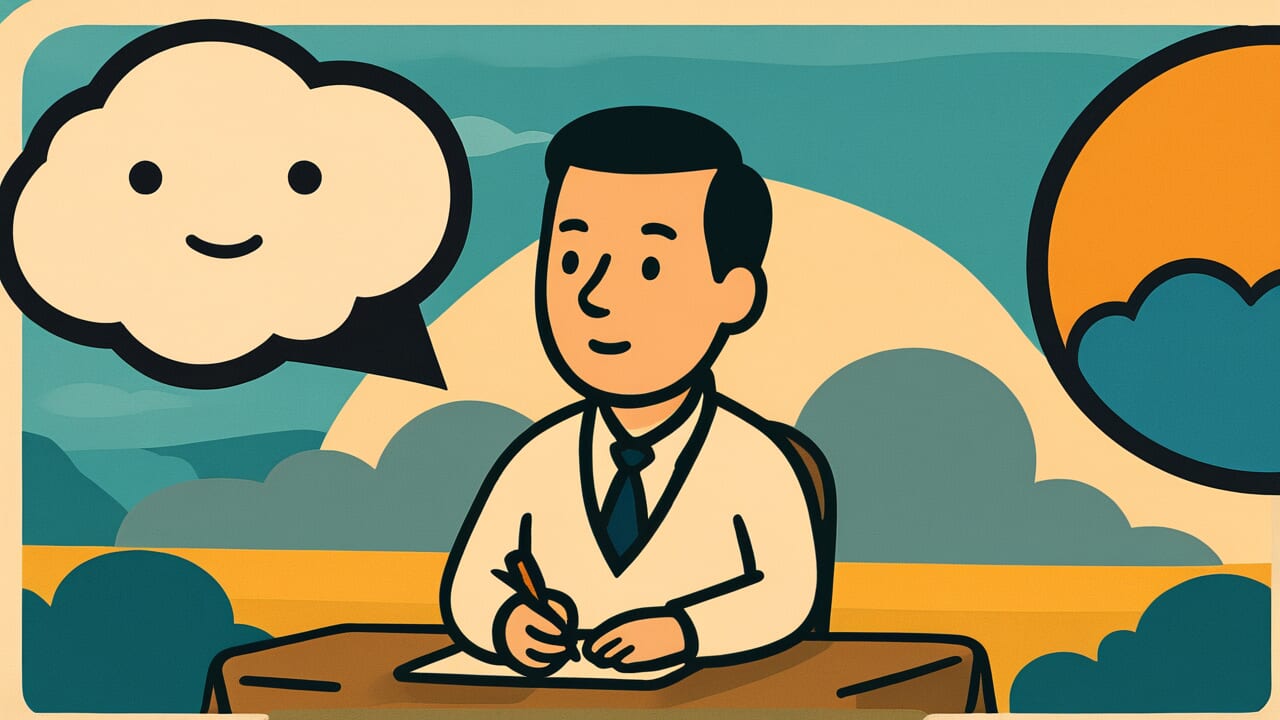How to Read “The wish is father to the thought”
“The wish is father to the thought”
[thuh WISH iz FAH-ther too thuh THAWT]
The word “father” here means “creator” or “source.”
Meaning of “The wish is father to the thought”
Simply put, this proverb means that what we want to happen shapes what we think will happen.
When we really want something, our desires can trick our minds. We start believing things might work out just because we hope they will. The proverb uses “father” to mean the creator or source. So our wishes create our thoughts about what’s possible or true.
This happens in everyday life more than we realize. Someone might think they’ll win the lottery because they need money badly. A student might convince themselves they passed a test because they really want good grades. People in love often believe their feelings are returned even without clear signs.
What makes this wisdom interesting is how automatic it feels. We don’t usually notice when our hopes are influencing our thinking. The mind quietly adjusts what seems likely based on what we desperately want. Understanding this pattern helps us recognize when our desires might be clouding our judgment about reality.
Origin and Etymology
The exact origin of this proverb is unknown, though it appears in English literature from several centuries ago. The phrase captures an idea that philosophers and writers have explored for a very long time. Ancient thinkers noticed how human desires could distort reasoning and perception.
During earlier periods of history, this type of wisdom was especially valuable. People had less access to information and fewer ways to check facts. Understanding how wishes could mislead thinking helped people make better decisions. Communities passed down sayings like this to warn against self-deception.
The proverb likely spread through written works and spoken tradition. Over time, it became a common way to describe wishful thinking. The formal language reflects older English styles, but the core idea remains relevant. Modern psychology has confirmed what this old saying observed about human nature.
Interesting Facts
The word “father” in this context comes from an older meaning of “originator” or “source.” This usage appears in many traditional English phrases where “father” doesn’t refer to a parent.
The proverb’s structure follows a common pattern in English sayings where family relationships represent cause and effect. Similar expressions use “mother,” “child,” or “parent” to show how one thing creates another.
This saying demonstrates personification, giving human family roles to abstract concepts like wishes and thoughts. This literary device made complex psychological ideas easier to remember and share before modern education was widespread.
Usage Examples
- Manager to employee: “You think the promotion is guaranteed just because you want it badly – the wish is father to the thought.”
- Friend to friend: “Just because you’re hoping your ex will call doesn’t mean they actually will – the wish is father to the thought.”
Universal Wisdom
This proverb reveals a fundamental tension in human psychology between hope and reality. Our survival as a species has always depended on both accurate perception and optimistic motivation. We need to see the world clearly to avoid dangers, but we also need hope to keep trying when situations look difficult.
The mind’s tendency to let wishes influence thoughts serves important purposes. Optimistic thinking can provide energy for difficult tasks and help people persist through challenges. However, this same mechanism can lead to poor decisions when desires override careful analysis. The brain struggles to balance realistic assessment with motivational hope.
What makes this pattern so universal is its connection to how we process uncertainty. When facing unknown outcomes, the mind fills gaps with information that feels emotionally satisfying. This happens automatically, below conscious awareness. People across all cultures and time periods have noticed this tendency because it affects every human decision involving future possibilities. The wisdom endures because it identifies something we cannot eliminate from our nature, only recognize and manage more skillfully.
When AI Hears This
Our minds work like internal shopping centers where wishes have unlimited credit cards. When we want something to be true, that desire starts buying up evidence. It trades away facts that don’t fit and hoards information that supports our goals. This creates mental neighborhoods where certain beliefs get rich while contradictory thoughts go bankrupt.
This trading system runs automatically without our awareness or permission. We think we’re being logical, but our wants are actually the store managers. They decide which thoughts get prime shelf space and which get hidden. Every human does this because survival often required believing we could succeed. Hope needed to outbid fear to keep us moving forward through difficulties.
What fascinates me is how this creates beautifully organized delusion systems. Humans build elaborate mental worlds that feel completely real and logical inside. Each wish constructs its own evidence empire with supporting facts as loyal citizens. The result is billions of people living in slightly different realities. It’s chaotic yet somehow works perfectly for human flourishing.
Lessons for Today
Living with this wisdom means developing awareness of when desires might be influencing judgment. The goal isn’t to eliminate hope or optimism, but to recognize when wishes are creating unrealistic expectations. This awareness helps in making decisions that account for both possibilities and limitations.
In relationships and group settings, understanding this pattern helps interpret others’ perspectives more clearly. When someone seems overly confident about an outcome they desperately want, their wishes might be shaping their reasoning. This insight can guide more effective communication and collaborative planning without dismissing people’s hopes entirely.
The broader challenge involves learning to hold both realistic assessment and genuine hope simultaneously. This requires practicing honest evaluation while maintaining motivation to pursue meaningful goals. Rather than seeing wishes and clear thinking as opposites, the wisdom suggests developing skill in recognizing when each is most helpful. This balance becomes easier with experience and conscious attention to how desires influence daily thinking patterns.



Comments